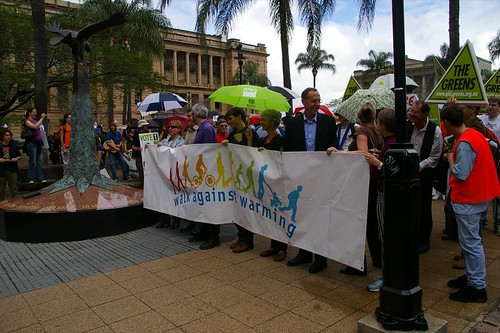From ABC News Australia
No this is right, despite the Federal Labor Party's commissioned report on how Australia should set its policies to tackle climate change, Penny Wong, the minister of Climate Change, has said that the party will NOT adopt one of the key recommendations. That is that Australia needs to play a lead role in reducing greenhouse gas emissions by going beyond its stated target of a 60 per cent cut by 2050.
Labor expected an economists report from the Economist Garnaut, and instead they got the truth and it doesn't fit in with their economic policies. So they've decided to take less interest in what he says. The prior Australian Federal Government, the Liberals, were heavily criticised for their role in ignoring climate change. The Labor party got elected partly on the basis that they are going to do something about the problem. Labor didn't want to read in the report that to make the best of a bad situation, Australia needs to drastically change the way it operates. Garnaut's recommendations are supported.
Read on for more information.
Executive Director of the Australian Conservation Council Don Henry, says it accepts the need for deep carbon emission cuts.
"Here's a leading economist saying that we need strong targets, that we've got to get cracking and he's saying it's bad for our economy if we don't act and good for our economy if we do," he said.
"I mean this a really important call for the whole of the Australian community, business, government and all of us at home, that we've got to get cracking on climate change.
Greens leader Bob Brown says the Government had previously put a lot of emphasis on Professor Garnaut's research, but now appears to be backing away.
"Penny Wong has reduced Ross Garnaut to input," he said.
"There are huge vested interests at play here - the coal industry, the aluminium industry, the forest logging industry - and it's up to the Rudd Government to put this country ahead of those vested interests."
Read the story.
Read the story on Garnaut's report (Aust 'most vulnerable' to climate change: Garnaut).
Read the Climate Code Red Report on the state of global warming from David Spratt of Carbon Equity and Philip Sutton from Greenleap Strategic Institute. Very sobor reading. Here's the overview:
The extensive melting of Arctic sea-ice in the northern summer of 2007 starkly demonstrated that serious climate-change impacts are already happening, both more rapidly and at lower global temperature increases than projected. Human activity has already pushed the planet’s climate past several critical “tipping points”, including the initiation of major ice sheet loss.
The loss in summer of all eight million square kilometres of Arctic sea-ice now seems inevitable, and may occur as early as 2010, a century ahead of the Intergovernmental Panel on Climate Change projections. There is already enough carbon dioxide in the Earth’s atmosphere to initiate ice sheet disintegration in West Antarctica and Greenland and to ensure that sea levels will rise metres in coming decades.
The projected speed of change, with temperature increases greater than 0.3°C per decade and the consequent rapid shifting of climatic zones will, if maintained, likely result in most ecosystems failing to adapt, causing the extinction of many animal and plant species. The oceans will become more acidic, endangering much marine life.
The Earth’s passage into an era of dangerous climate change accelerates as each of these tipping points is passed. If this acceleration becomes too great, humanity will no longer have the power to reverse the processes we have set in motion.
We stand at a time where we still have the power to make a choice. Only by dealing with the full scale and urgency of the problem can we create a realistic path back to a safe-climate world. Targets should be chosen and actions taken that can actually solve the problem in a timely manner. A temperature cap of 2–2.4°C, as proposed within the United Nations framework, would take the planet’s climate beyond the temperature range of the last million years and into catastrophe.
The loss of the Arctic sea-ice unambiguously represents dangerous climate change. As the tipping point for this event was around two decades ago when temperatures were about 0.3°C lower than at present, we propose a long-term precautionary warming cap of 0.5°C and equilibrium atmospheric greenhouse gas level of not more than 320 parts per million (ppm) carbon dioxide.
The USA’s leading climate scientist, James Hansen, stated recently that we should set an atmospheric carbon dioxide target that is low enough to avoid “the point of no return”. To achieve this, he says, we must not only eliminate current greenhouse gas emissions but also remove excess carbon dioxide from the atmosphere and take urgent steps to “cool the planet”.
These scientific imperatives are incompatible with the “realities” of “politics as usual” and “business as usual”. Our conventional mode of politics is short-term, adversarial and incremental, fearful of deep, quick change and simply incapable of managing the transition at the necessary speed. The climate crisis will not respond to incremental modification of the business-as-usual model.
There is an urgent need to reconceive the issue we face as a sustainability emergency, that takes us beyond the politics of failure-inducing compromise. The feasibility of rapid transitions is well established historically. We now need to “think the unthinkable”, because the sustainability emergency is now not so much a radical idea as simply an indispensable course of action if we are to return to a safe-climate planet.
Read More......




